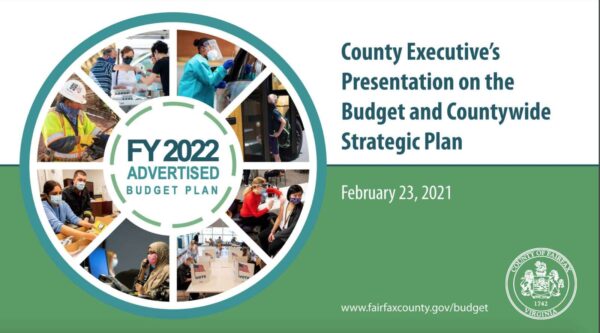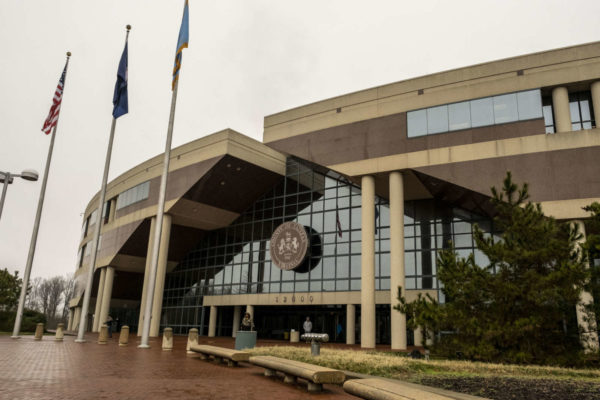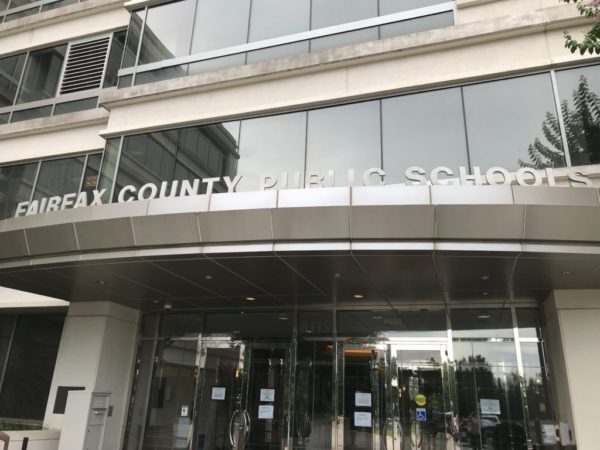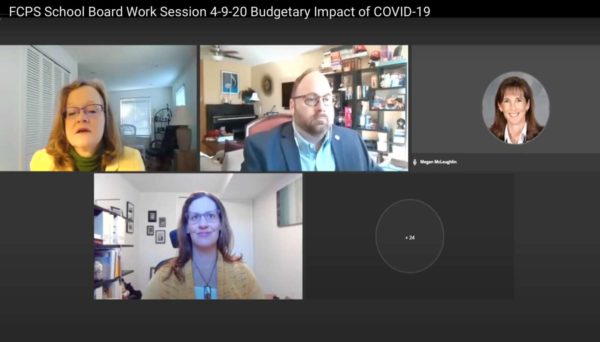Search Results for "budget"
The real estate tax, a proposed freeze on county employees’ wages, and affordable housing were on top of residents’ minds at the Hunter Mill District virtual budget town hall on Monday (March 29).
Hosted by District Supervisor Walter Alcorn, the town hall gave residents the chance to provide feedback and ask questions about the county’s proposed budget for fiscal year 2022, which begins on July 1.
Fairfax County Department of Management and Budget Director Christina Jackson kicked off the meeting with a review of the proposed budget, which termed as “conservative” due to the ongoing pandemic and lost revenue associated.
Highlights include decreasing the real estate tax rate by one cent to $1.14 per $100 assessed value, schools receiving a half percent increase in funding compared to 2021, no pay increases for county employees, and “modest investments” in Board priorities like public safety staffing, environmental initiatives, and opioid use prevention efforts.
The Fairfax County Board of Supervisors voted on March 9 to advertise a real estate tax rate of $1.15. The final adopted rate could be lower but not higher than that limit.
The proposed decrease in the real estate tax rate is intended to give homeowners a bit of financial relief at a time when the unemployment rate remains high. Even with the reduction, however, the average real estate tax bill will still go up by more than $200 due to significant increases in assessed value for many county residential properties.
Lowering the real estate tax also takes about $27 million off the table for the county to use to fund other priorities, such as increased compensation for county employees and affordable housing initiatives, Alcorn noted.
“We tied at least one hand behind our back by [advertising] the tax rate at $1.15,” he said.
Under the proposed budget, this would be the second straight year that county employee wages will not be increased.
One resident participating in the town hall said she was “incredibly disappointed” in the potential salary freeze, particularly because some neighboring jurisdictions, such as Loudoun and Prince William counties, are raising wages for employees.
“We are failing our employees who can’t afford to be [county] residents,” the resident said. “It’s really disappointing to see that the county doesn’t want to retain us because they don’t want to pay us.”
Alcorn responded that he was also very concerned about the implications of the pay freeze. Jackson noted that the county is considering potential bonuses and are annually reviewing job classifications for potential increases in 2023.
“We are trying to find ways to reward our employees with compensation increases,” Jackson said. “I anticipate that 2023 is going to be different and we might have to do a little bit of catching up if those jurisdictions do provide sizable pay increases.”
Alcorn argued that decreasing the real estate tax rate will make it “very hard” to make progress on the county level to expand the availability of affordable housing, something that has long been a challenge for Reston and a priority for the supervisor.
One south Reston homeowner commented that the annual increases in value for her townhouse have become a concern not only because it raises her tax bill, but also because it means so-called “starter homes” are no longer affordable for those looking to live in Fairfax County.
“Frequently, I go out and there’s a new baby in the neighborhood. Those are the people buying these houses,” she said. “…Because of these increases, these [houses] are increasingly becoming out of reach for many people.”
Hanging over the budget discussion is the possibility that Fairfax County will receive as much as $222 million from the most recent federal stimulus package, though the county does not know exactly when that money will come in.
The budget does not factor that money in, because it’s a one-time payment, as opposed to recurring dollars, Jackson explained.
In the last stimulus package, Fairfax County received about $200 million that was used for a myriad of needs, including virtual education, contact tracing program, business relief grants, and pandemic-related administrative leave.
Public hearings on the proposed budget will be held on April 13-15. It will go through mark-ups on April 27 and is scheduled to be adopted on May 4.
Image via Fairfax County government
Fairfax County is considering lowering its real estate tax rate by one cent for the next fiscal year in an attempt to give relief to homeowners during the ongoing COVID-19 pandemic.
County Executive Bryan Hill presented the proposal to the Fairfax County Board of Supervisors yesterday (Tuesday) as part of an advertised Fiscal Year 2022 budget that illustrated how the pandemic has curtailed the county’s ability to fund top priorities, from education and employee pay to affordable housing and environmental initiatives.
According to Hill, the county’s residential real estate market has been “very strong” over the past year with 88% of residential properties seeing an increase in assessed value, but that also places a greater burden on homeowners at a time when unemployment is up and many people are struggling to pay their bills.
Noting that upticks have been highest for properties that typically house lower-income residents, like townhomes and condos, Hill says that, with no change to the rate, the average tax bill would increase by almost $285 for the coming year. Lowering the rate by a cent to $1.14 per $100 of assessed value would bring the average increase closer to $224.
“Homeowners have struggled due to a loss of income during the pandemic,” Board of Supervisors Chairman Jeff McKay said. “I appreciate that the County Executive has created a budget that reflects these uncertain financial times. Next year’s proposed budget does not meet every community need, but shows our commitment to preserving County programs and working to protect our residents in these uncertain times.”
The proposed tax rate decrease was coupled with an overall conservative approach to the advertised budget, which freezes pay increases for county employees for the second consecutive year and funds only a fraction of Fairfax County Public Schools’ request.
The Fairfax County School Board sought an additional $104.4 million from the county, primarily to cover a proposed 3% pay raise for all FCPS employees, but Hill’s advertised budget increases the county’s transfer by only $14.1 million.
During a press conference following the budget presentation, education advocates in the Invest in Fairfax Coalition — a grassroots organization comprised of county employee groups, residents, and other community members — urged the Board of Supervisors to give the school system more funds to pay workers and provide mental health services for students, among other needs.
“We’re very disappointed with the county executive’s proposed budget and its failure to prioritize schools,” Fairfax County Federation of Teachers President Tina Williams said. “To help students and staff recover from this pandemic, we urge this county to adopt a budget that keeps our community whole and opens our schools safely.”
Hill’s advertised budget makes similarly modest investments in the county government, providing a net revenue increase of just $11.7 million.
According to Hill, funding the county’s employee compensation program would cost more than $55 million, including almost $30 million for a calculated 2% market rate adjustment.
“We simply do not have the resources available at this time,” Hill said.
Outside of FCPS, the most substantial investments in the advertised budget are related to public safety, including the rollout of the police body camera program, the Office of the Commonwealth’s Attorney, and staff for the new South County Police Station and Scotts Run Fire Station.
The proposal also includes funding for new health department staff, Coordinated Services Planning, collective bargaining work, and two new positions in the Office of Elections. In addition, Hill recommends that the board set aside $20 million to support economic recovery efforts.
“As I look ahead into fiscal [year] 2023, I have hope for a more positive budget year, but it will still be a challenge,” Hill said. “Employee compensation and other board priorities, such as affordable housing and school revenues, which have not been adequately addressed as part of this budget, will be at the forefront of our conversations.”
Invest in Fairfax Coalition Chair David Edelman says he was “a little surprised” to see the tax rate decrease in the proposed budget, since the group had anticipated the rate would remain the same. While the coalition consists of people with different backgrounds and focuses, their overall goal is to encourage Fairfax County to invest in public services and employees.
“Now more than ever, it’s critical that our budget reflects the values, priorities, and urgent need of our diverse community,” Edelman said.
The Board of Supervisors will officially approve an advertised tax rate on Mar. 9, and public hearings on the FY 2022 budget will take place on Apr. 13-15.
Each supervisor will host a budget town hall for their magisterial district. The schedule for districts in the Tysons area are as follows:
- Dranesville: Mar. 1 at 7:30 p.m. through the McLean Citizens Association
- Hunter Mill: Mar. 29 from 7-9 p.m. through WebEx and Supervisor Walter Alcorn’s YouTube Live channel
- Providence: Mar. 8 from 7-9:30 p.m. It will be streamed on TV, Fairfax County’s website, and Facebook Live.
The board will adopt a final FY 2022 budget on May 4.
Staff photo by Jay Westcott
The Fairfax County School Board unanimously adopted an advertised Fiscal Year 2022 budget for the county public school system when it met last Thursday (Feb. 18).
The $3.2 billion budget includes a $60.3 million increase in Fairfax County Public Schools’ request for funding from the county board of supervisors to increase employee compensation rates by 3%, a significant change from what FCPS Superintendent Scott Brabrand proposed in January.
Anticipating a tough financial year due to the continued impacts of the COVID-19 pandemic, Brabrand had originally proposed freezing staff salaries aside from $3 million to complete a three-year push to bring the salaries of instructional assistants and public health training assistants up to 50% of the salary scale for teachers who have bachelor’s degrees.
Improving employee compensation has been a priority of the school board in recent years, as the board seeks to restore over $70 million and nearly 2,700 positions that have been cut since 2008, according to Lee District Representative Tamara Derenak-Kaufax.
“As a board, we must be committed to making certain we are hiring and retaining the best and brightest employees to teach our children, to counsel our children, to transport our children, to feed our children, and to ensure that their social and emotional needs are being met,” Derenak-Kaufax said. “In order to do so, we must be competitive with our surrounding jurisdictions.”
On top of the requested county transfer funds, FCPS projects that it could receive an additional $13.4 million in state revenue to cover the compensation increases based on a proposed budget from the Virginia State Senate that would provide a 3% salary bump for public school educators.
When approving the advertised budget, the school board also amended Brabrand’s proposed budget to include an additional $1.4 million to hire instructional coaches at six Title I elementary schools and create pay parity for elementary school principals and assistant principals.
Overall, the FY 2022 advertised budget seeks to increase FCPS funding by 2.4%, or $75.5 million, compared to the school system’s approved FY 2021 budget.
In addition to employee compensation, the increase provides for expanded preschool special education classes, retirement rate increases and rising health care costs, and support for student needs related to the pandemic, according to FCPS.
The budget also includes $4.9 million and 50 staff positions for English as a Second Language programs at the elementary school level, along with $500,000 and three positions for a collective bargaining team after the Virginia General Assembly passed legislation in 2020 allowing localities to recognize collective bargaining rights for public employees starting on May 1.
Karen Corbett-Sanders, who represents Mount Vernon District on the Fairfax County School Board, noted that the advertised FY 2022 budget does not include money for possible summer school programming, which will instead come from federal COVID-19 relief funds that Congress approved in December.
“We recognize that the past year has been incredibly difficult for our community,” Brabrand said. “This budget is designed to bring hope to students, their families and our staff by providing the resources each of them needs to help recognize and support all their extraordinary contributions during this pandemic.”
While not included in the advertised budget, the school board also directed Brabrand to identify funds to create positions for a neuro-diversity specialist and a trauma-informed social emotional learning specialist, roles that are, respectively, intended to provide support for students with disabilities and address students’ mental health needs.
At-large member Rachna Sizemore Heizer, who was a disability rights advocate before being elected to the school board in 2019, says having a neuro-diversity specialist could be “transformative” in helping eliminate disparities in academic achievement and discipline for students with disabilities.
“A neurodiversity-oriented approach, with its focus on student strengths, positive teacher expectations, and inclusion of the lived norms of students with disabilities within the norms of classrooms, can improve outcomes for students with disabilities and set them up for success after they leave FCPS,” Sizemore Heizer said.
County Executive Bryan Hill is scheduled to present his proposed FY 2022 budget to the Fairfax County Board of Supervisors tomorrow (Tuesday). The school board will present its advertised budget to the Board of Supervisors on Apr. 13 and adopt an approved FY 2022 budget on May 20.
Metrorail is now operating at the same frequency during peak and off-peak hours on weekdays after budget changes prompted by the impact of the COVID-19 pandemic took effect yesterday (Monday).
Under the revised Fiscal Year 2021 budget, trains are running every 12 minutes on the Orange, Silver, Blue, Green, and Yellow lines, while Red line trains operate every six minutes. Service after 7 p.m. and on weekends has not been altered.
The reduction of rail service during weekday rush hours was recommended as part of a revised FY 2021 budget that the Washington Metropolitan Area Transit Authority Board of Directors approved when it met on Nov. 19.
“The changes bring rail service in line with ridership demand while managing costs amid pandemic-related budget constraints,” WMATA said in a news release. “Rail ridership remains down nearly 90 percent from pre-pandemic levels.”
In contrast, WMATA says Metrobus ridership is only down 55% on weekdays and less on weekends compared to pre-pandemic levels, so service will expand to accommodate additional capacity starting on Mar. 14.
“Customers will see more buses, more often on the 125 lines of service currently operating, and more routes will be added to expand bus service on weekends,” WMATA said.
More details about the March Metrobus service changes will be provided at a later date, the transit agency says.
Photo by Chuck Samuelson/Dulles Corridor Metrorail Project
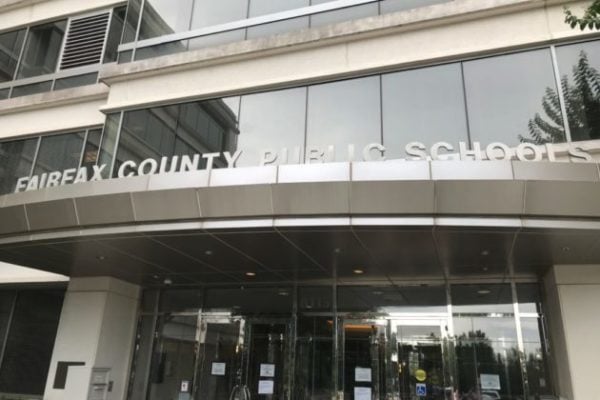
Fairfax County Public Schools Superintendent Scott Brabrand is asking for a $3.1 billion budget for the 2022 fiscal year that focuses “on the most pressing needs” of the school system.
He presented the nearly level-services budget — “a modest request” with an approximately $400,000 increase — to the county school board last Thursday (Jan. 7).
The proposed budget requests a $42.7 million increase in transfer funds from the county government to pay for new preschool special education classes, retirement rate increases, and rising health care costs, which would patch over a gap created by drops in county and state revenue due to the COVID-19 pandemic.
“As all of you know, the COVID-19 pandemic has impacted FCPS, our students, families, and staff in ways we couldn’t have imagined,” Brabrand said during the meeting. “I have designed a budget to meet the educational and social-emotional needs of our children so they can continue to learn and grow despite the challenges of the past year.”
The proposed budget includes money for distance learning, including cybersecurity protection and Zoom, which will replace Blackboard for web-conferencing, he said.
The budget does not contain compensation increases for most employees, though there is $3 million to finish a three-year initiative to increase the salaries of instructional assistants and public health training assistants.
In December, Virginia Gov. Ralph Northam outlined a state budget for schools that features a one-time, 2% bonus for teachers and support staff, with the potential for the salary boost to become permanent. But Brabrand said Fairfax County is opting out because it cannot afford to participate.
The burden would be on Fairfax County to match state funds with $32 million in county-level funding, he said.
“We understand that [FCPS] kept everybody whole,” Fairfax Education Association President Kimberly Adams said. “But many staff see it as a slap in their face.”
In comparison, Prince William County offered compensation increases in its budget last year , and Loudoun County’s proposed budget for the upcoming fiscal year includes money to cover compensations that were frozen last year, she said.
“If Loudoun and Prince William moved two steps ahead of Fairfax, we’re behind,” she said. “People are already irritated. This is a potential reason to leave.”
The lack of compensation particularly hurts Virginia teachers, who have the largest teacher wage penalty in the country at 32.7%, Fairfax County Federation of Teachers President Tina Williams said.
“We’re disappointed that the FCPS proposed budget does not include a pay increase for school employees, especially after a year that is the hardest in their career,” she said in a statement. “We urge FCPS to demonstrate it values the hard work and dedication of its employees by providing wage and cost of living adjustments to help keep employees whole.”
The Fairfax County School Board will hold a work session to discuss the proposed budget tomorrow (Tuesday). A public hearing has been scheduled for 6 p.m. on Jan. 26, though it could carry over to Jan. 27 if needed.
The school board will adopt its advertised budget on Feb. 18 and present it to the Board of Supervisors on April 13. A final approved budget is scheduled to be adopted on May 20.
Like other towns throughout the state and country, the Town of Herndon’s budget has been hit harder by the COVID-19 pandemic than counties as other larger municipalities.
But Jennie Tripoli, the town’s finance director, hopes things will “start to turn the corner” over the summer as vaccinations and warmer weather bring more normal conditions to the area.
At a recent Herndon Town Council meeting — the first session with newly-elected members and Mayor Sheila Olem — Tripoli said that the town had to sequester roughly $5.5 million in funding in fiscal year 2021. In the next fiscal year, the town hopes to transition from surviving to reviving itself.
The currently authorized budget for FY2021 is roughly $33.3 million, a figure that is short of projections by roughly $450,000. The town received $2.4 million in funding from the federal CARES Act.
But like other towns, Herndon was excluded from the latest round of federal funding.
The challenges posed by the pandemic are unique to the town. Unlike the county, the town relies heavily on excise taxes like the meals tax for funding.
The town took big hits in many sources of revenue. For example, revenues from fines and forfeitures decreased by 44 percent, when reductions of roughly 10 percent were originally anticipated. Similarly, fees from services for parks decreased by 91 percent instead of the original 56 percent decrease projected by staff.
As the town looks toward preparing the FY2022 budget, Tripoli cautioned that much is still uncertain about the budget, consumer habits, the path of the virus, and vaccinations.
So far, the county is expecting a three-percent increase in revenues from residential real estate taxes. However, a 10 percent decrease in non-residential retail and hotels, as well as local taxes like meals and transient occupancy, is still expected for the next fiscal year.
Fees from building inspections are also expected to normalize, she said.
“We’re still in unprecedented economic uncertainty,” she said, adding that the hope is “gradual recovery” begins in the summer of this year.
The town council is expected to hold additional work sessions on the budget later this month.
Image via Herndon Town Council

The Reston Association (RA) still has decisions to make on its 2021 budget, including any potential change to the current $708 member assessment rate.
During a public hearing on Wednesday, a proposed budget by RA CEO Hank Lynch remained consistent with his October proposal by not including an increase from the current $708 rate.
Lynch did stipulate that the assessment is one of the key points the Board of Directors must still decide on. He said that the fiscal committee for RA has recommended an increase to the assessment of up to $20 for the 2021 budget.
Lynch stated that the fiscal committee suggested there is the potential of an increase of up to $100 for the assessment in 2022. But he said he does not believe there will be that significant of an increase for the 2022 assessment rate.
Robert Petrine, treasurer for the board, clarified the discussion on the potential 2022 assessment rate increase of up to $100.
“There are two major components that are not in the current 2021 budget, which if we look forward is number one is if you implement the salary plan, that’s going to have a material impact,” he said.
“And number two; we’re going to be fully paying on the (headquarters) lease. When you put those in and you also factor in the amount of capital projects that are already in the budget and projected for 2022, in order to have everything balanced, you’re looking at a substantially higher assessment.”
Lynch also discussed the decision point for the board of an operational change with the Central Services Facility (CSF) that mows the Reston roadways and median strips.
CSF is paid $45,000 in an annual contract through the Virginia Department of Transportation to mow Reston’s roadways and median strips three times. However, CSF mows those areas 24 times during the year to maintain Reston’s appearance. The additional mowing costs RA an additional $140,000 above the contract.
Beyond the roadways, CSF also brings in a turf maintenance company to mow many of the ball fields, parks and open spaces. This additional maintenance costs the association over $200,000 annually.
Lynch’s proposal for the board’s consideration includes the following measures to reduce CSF’s 2021 operating costs by $200,000 to $210,000:
- Reduce the number of VDOT highway mows from 24 down to eight.
- Eliminate contracted mowing services used for RA’s ball fields, parks and open spaces.
- Utilizing current full-time CSF staff and five seasonal staff to conduct all RA mowing.
During discussions with RA members following Lynch’s presentation and the boards’ comments, a primary focus fell on RA’s communications budget and, in part, the participation of members in RA’s planning.
While Petrine complimented the board’s participation and the members that joined the discussion, he admonished “the general membership for lack of concern and participation.”
Board member Selvaraj-D’Souza stated that this is where Lynch’s “team is failing” in its communication efforts.
The operating expenses for communications for the 2020 budget was $968,114. In Lynch’s proposal, those expenses increased to $979,373 for 2021.
“When we’re spending a million dollars on communications, we need to be proactive and figure out a way to get our membership to show up,” she said.
“And that’s where we need to look at out of the box ideas, how are we reaching out to them, is our messaging actually being effective. And there needs to be some absolute accountability with that.”
Board member Ven Iyer echoed the suggestions of Selvaraj-D’Souza. Iyer suggested efforts be turned toward “grassroots level participation in order to shape the direction where this organization is headed.”
Lynch defended the communications department’s efforts, stating that he believes “there’s a complete misunderstanding of what communications does.”
He added that with roughly 60,000 members, an “enormous amount of work” is required to serve all the needs and wants of the members.
Board member Mike Collins followed the discussion by stating that RA has had difficulty in member participation for at least the 10 years he’s been in Reston. He also did not recommend that members should assume something is wrong with the efforts of the communications department.
However, Collins did discuss his belief that board members take a look at digging more into those details of the budget next year.
Board president Julie Bitzer concluded the discussion by agreeing with the notion that the board needs more information on the communications to reach a more appropriate “comfort level.” She suggested reviewing more details on the communications budget during the board’s next meeting.
The board will next meet virtually on Nov. 19 via Zoom.
If Reston Association maintains an assessment of $708 for 2021, members could see a fee increase of up to $100 in 2022, according to CEO Hank Lynch’s meeting materials.
RA’s Board of Directors will hold a public hearing tonight to discuss the proposed assessment of $708, which was pitched by Lynch. At the board’s request, RA is considering a possible increase of up to $728. Some board members hope a slight increase this year will prevent higher increases in the coming years.
Much of the budget’s assumptions rest on unclear factors. For example, the impact of the coronavirus pandemic is unknown.
An assessment of major capital needs is due from RA’s Recreational Facilities Working Group. The assessment will be used to determine RA’s future capital needs and projects’. Impact on the 2022 assessment rate.
Lynch has proposed deferring many expenses to 2022 and beyond. Roughly $1.3 million in capital work has been deferred to future years. No staff merit pay increases as planned as part of the 2021 budget.
The budget hearing will begin at 6:30 p.m. today.
The Reston Association Board of Directors will hold a special meeting on November 4 at 6:30 pm for a Public Budget Hearing.
Join Zoom Meeting: https://t.co/Rk0pdBfFjl
Meeting ID: 942 3628 0245
Passcode: 263425 pic.twitter.com/zRANuCalmn— Reston Association (@RestonOnline) October 6, 2020

Reston Association‘s Board of Directors will hold a special meeting next. Week to discuss budgetary matters.
The board will meet on Wednesday, Aug. 19 to discuss the formation of the fiscal year 2021 budget.
RA CEO Hank Lynch is set to offer information about assumptions related to the budget, which will be formed with the backdrop of the COVID-19 pandemic.
Laura Kowalski, RA’s director of recreation and environmental education, will also present information about her department’s request for parks and recreation.
The meeting is set to begin at 6:30 p.m. via Zoom. Log-in information is available online. RA’s fiscal committee will also participate in the meeting.
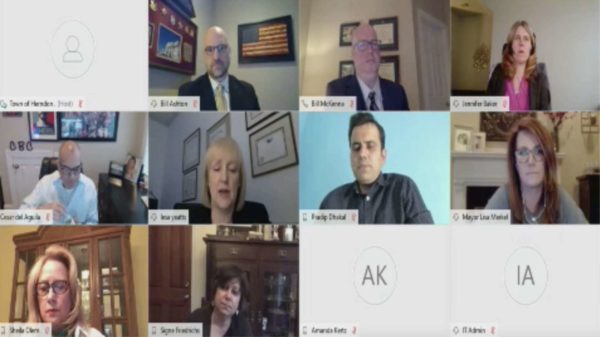
After revisions to its previous proposal, the Herndon Town Council formally adopted its budget for FY2021 this week.
The $61 million budget was scaled back to adapt to economic fluidity and uncertainty caused by the COVID-19 pandemic. The town’s taxes and fees, including real estate and meals taxes, remain changed. But the town’s recycling fee doubled from $8 per quarter to $16 per quarter.
Unlike previous budgets, the document includes $11.5 million in immediately sequestered funds, $5.5 million of which will be attributed to the town’s general fund. Overall, the FY2021 budget allocates $38.8 million for the general fund.
Sequestered funds can be spent if the town achieves its revenue targets through the fiscal year. But if revenues fall below projections, the town may need to consider reductions in personnel costs.
“While the adopted General Fund budget is $38.8 million, in practice it will be considered a $33.3 million budget,” said Mayor Lisa Merkel. “Sequestered funds may only be released if and when identified targets are met. This gives us latitude to adapt to the unstable and uncertain fiscal environment we are in. It also gives us the best chance to maintain our exceptional workforce.”
The adopted budget will be posted on the town’s website by July 1, the beginning of the new fiscal year.
Photo via Herndon Town Council/Zoom
In response to Fairfax County’s revised budget, Hunter Mill District Supervisor Walter Alcorn stressed that flexibility is key as the county weathers the economic impact of COVID-19.
The upcoming fiscal year 2021 budget, which is expected to be adopted on May 12 and begin on July 1, underwent revisions earlier this spring to address uncertainties stemming from the pandemic.
Though he expressed disappointment that COVID-19 altered the budget, he said he hopes for economic recovery.
“I strongly believe that we will recover and it should be noted that the Board of Supervisors will have the opportunity to make adjustments at our quarterly reviews,” he said. “This budget is by no means a done deal.”
In the future, Alcorn said he expects the budget to be a living document.
“It is also clear that we still don’t know what the final impacts of the virus will be, so we must continue to be flexible and strategic,” he said.
Earlier in April, he expressed displeasure with the revised budget draft. Now, Alcorn’s latest statement includes many of his previous concerns over a lack of support for local business owners.
“Going forward, I anticipate additional funds being used to help small businesses and others offset the impact of the pandemic on the most vulnerable in our county,” Alcorn said in his statement.
In the statement, Alcorn also reflected on the FY 2020 third-quarter review, saying there is now $200 million in additional funding for the Coronavirus Aid, Relief, and Economic Security (CARES) Act.
The act benefits both families and small businesses, according to the U.S. Department of Treasury.
One of Alcorn’s main concerns was how Latino populations are being hit harder by the virus than other demographics around the county.
“Latinos represent 55% of all COVID-19 cases in Fairfax County even though they represent only 16% of the population,” he said, adding that “in Fairfax County stopping COVID starts with the Latino community.”
To address this, Alcorn suggested the application of the county’s One Fairfax policy, which aims to promote social and racial equity, but did not expand on how One Fairfax would directly be applied.
Photo courtesy Hunter Mill District
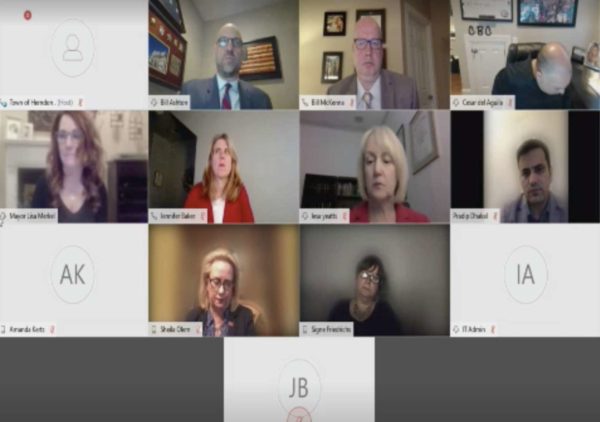
Prompted by the coronavirus pandemic, the Town of Herndon’s revised budget for the next fiscal year proposes a half-a-million-dollar cut from the original proposal.
The $38 million proposal eliminates a planned one-cent increase in the real estate tax, a projected increase of $100,000 in revenues from the Business, Professional ad Occupational License tax, and pay increases for town staff.
Herndon Town Manager Bill Ashton II is also calling on the Herndon Town Council to immediately sequester $5.5 million that can be spent when the town achieves revenues targets int he next fiscal year.
Overall, however, the budget is not materially different from the original proposal.
Ashton noted that the uncertain pace of economic recovery and lack of data on projected revenues creates an “extremely fluid” economic environment. If revenues fall below projections, the town will consider exploring reductions in personnel costs, the town’s largest spending category by far.
Here’s more from Ashton II on the updated plan:
“The shortcoming of this proposal is that it does not directly consider how significant changes to the economy will affect the town’s revenues moving into, and through, FY 2021. The problem with creating such a forecast is that we have limited data to support creating assumptions on which to build these projections. If we were to establish projections based on the small data sampling we have today, we would be forced into significant personnel reductions in this budget. Such reductions would cause the town to incur additional costs and would be difficult to unwind should the revenue situation materialize better than expected. “
He also noted that the town’s budgeting approach will keep the town from “over-committing in its response to a worst-case scenario,” allowing the town to adapt to a changing economic climate in the post-COVID-19 world.
A work session on the budget is set for May 5, followed by public hearings on May 12 and May 26. All meetings, which begin at 7 p.m., will be held online. In addition to comments at meetings, residents can submit comments online or by emailing [email protected].

The Town of Herndon’s proposed budget for next year is slated for major changes, according to Herndon Town Manager Bill Ashton.
At a Herndon Town Council meeting last night (Tuesday), Ashton said that town officials are closely monitoring current expenditures and revenues. The revised budget for fiscal year 2021 will be released on May 1.
“We are making some very dramatic changes to it,” Ashton said, adding that the town’s revenue streams are doing “a little better” than town staff originally projected.
The Herndon Town Council will review the budget at work sessions on May 5 and May 19, followed by public hearings on May 12 and May 26.
All sessions will be held online due to the ongoing COVID-19 public health emergency. The town will release more information on how to make live public comments during the public hearing. Residents can also submit comments on the proposed budget by emailing [email protected].
Image via Town of Herndon
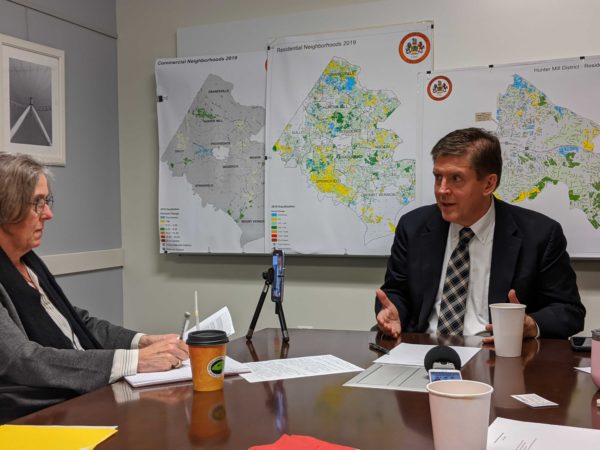
Hunter Mill District Supervisor Walter Alcorn plans to hold another virtual town hall on the proposed budget for the next fiscal year.
The budget town hall, which also took place earlier this month, is set for Friday (April 24) at 12:30 p.m.
In a newsletter, Alcorn stated that the “lunch tie discussion” will also feature Melanie Meren, the school board member for the Hunter Mill District, and Christina Jackson, director of the county’s Department and Budget.
Details on how to participate will be released soon.
The coronavirus pandemic has driven major changes in the proposed budget, including elimination of tax rate increases. The budget assumes that no net increase in the county’s revenues is expected.
As the coronavirus pandemic creates turmoil for the fiscal year 2021 budget considerations, Fairfax County Public Schools aims to mirror Fairfax County’s budget revision approach.
The Fairfax County School Board tackled changes to the FCPS budget during its meeting yesterday.
Marty Smith, the chief operating officer for FCPS, shared in a presentation that Superintendent Scott Brabrand is looking to mirror the reduction strategy being used for the county’s budget.
The presentation also noted that FCPS aims to maintain its existing staff, but will defer compensation increases to fiscal year 2022. Amendments and new strategic investments will also be pushed.
Extended Pay For Some Substitute Teachers
The school board also unanimously approved a motion that continues pay for part-time, temporary, hourly employees through April 24.
The motion applies to long-term substitute and does not include short-term substitute teachers.
The school board will reconsider pay for those employees when the superintendent provides more information to the board for the meeting on April 16.
At that upcoming meeting, the board will decide pay for the remainder of the school year.
“To Be Determined”
While FCPS is expecting several one time savings, many of the costs associated with the pandemic are still unknown.
So far, all of the financial amounts for categories, like social emotional supports and a COVID-19 second wave contingency plan, listed in FCPS’s “Post COVID-19 Response Plan” are “TBD,” according to the presentation.
Financial impacts related to unemployment and paid leave under the Families First Coronavirus Actare also unknown at this time.
FCPS may also face another, yet-to-be-determined impact: more students.
Brabrand said during the meeting that FCPS must prepare for a possible influx of students.
“It’s a job creation area and we have families in private school who may be financially impacted,” he said.
Image via FCPS/YouTube


